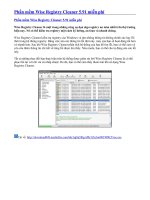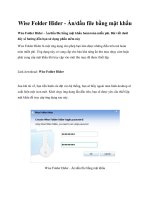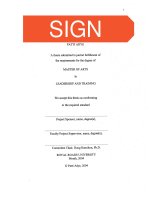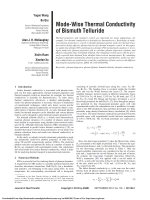Wordly wise 8
Bạn đang xem bản rút gọn của tài liệu. Xem và tải ngay bản đầy đủ của tài liệu tại đây (34.07 MB, 256 trang )
Direct Academic Vocabulary Instruction
Fourth Edition
Kenneth Hodkinson + Sandra Adams « Erika Hodkinson
EDUCATORS PUBLISHING SERVICE
Cambridge and Toronto
Editorial team: Carolyn Daniels, Marie Sweetman, Erika Wentworth
Cover Design: Deborah Rodman, Karen Swyers
Interior Design: Deborah Rodman
Vocabulary Extension Illustrations: Chris Murphy
Passage Illustrations for Lessons 2, 4, 10, 16: Q2AMedia
Passage Photograph Credits: Lesson 1: Courtesy, William J. Clinton Presidential Library; Lesson 3:
C.Schiller/Fotolia; Lesson 5: Robert Dodd/B. B. Evans/National Maritime Museum; Lesson 6: Georges
Jansoone; Lesson 7: The U.S. National Archives and Records Administration; Lesson 8: NASA
Headquarters - Greatest Images of NASA (NASA-HQ-GRIN); Lesson 9: NOAA's Geodesy Collection;
Lesson 11: Jesse Walter Fewkes; Lesson 12: Jerome Delahaye/Fotolia; Lesson 13: Sreedhar Yedlapati/
Fotolia; Lesson 14: Library of Congress Washington, D.C. 20540 USA; Lesson 15: Masterfile; Lesson 17:
Lawrence Jackson/Official White House Photo; Lesson 18: Library of Congress Prints and Photographs
Division Washington, D.C. 20540 USA; Lesson 19: Daniel Tager/Fotolia; Lesson 20: FSA/OWI
Collection/Library of Congress Prints and Photographs Division
©2018 by School Specialty, Inc. All rights reserved. No part of this book may be reproduced or
utilized in any form or by any electronic or mechanical means, including photocopying, without
permission in writing from the publisher.
Printed in Benton Harbor, MI, in May 2018
ISBN 978-0-8388-7708-1
2 354 PPG 21 2019 18
Contents
Lesson 1 Lesson 13 151
More Than Just a Pretty Flower 158
A Poet of the People
Lesson 2 13 Lesson 14 163
The Iceman Leonardo da Vinci:
20 Renaissance Man
Lesson 3 26 170
Telling Tales 33 Lesson 15 175
Who's Afraid of the Big,
Lesson 4 Bad Wolf? T81
The Tiger's Whisker 45
Lesson 16
Review for Lessons 1-4 50
The Wisdom of
Rabbi Rabinowicz
Lesson 5 $1 Review for Lessons 13-16
The Bounty, Part One
58
Lesson 6 63 Lesson 17 200
The Bounty, Part Two
70 The Country Without an Army 207
Lesson 7 75 Lesson 18 22
Women in Space, Part One
Prairie Women 219
Lesson 8
Women in Space, Part Two 87 Lesson 19 124
The Thousand-Year Battle
94 230
Review for Lessons 5-8 Lesson 20 235
Paul Robeson: All-American 242
Lesson 9 102 Review for Lessons 17-20 247
The Children of the Bounty
Lesson 10 114 Pronunciation Key 248
Rigoberta Menchu
121
Lesson 11 126
The Kachina Dolls of Oraibi
133
Lesson 12 138
Hearst Castle's Master Builder 145
Review for Lessons 9-12 150
Welcome to Wordly Wise 3000°
You've been learning words since you were a tiny baby. At first, you learned
them only by hearing other people talk. Now that you are a reader, you
have another way to learn words.
Obviously, it’s important to know what words mean, but lots of times, we
think we can get away without knowing someof them as we read. This
could cause a problem. Say you are reading the directions for a new game.
You know most of the words in the sentence you're reading. Then you stop
for a word you don't recognize:
Please do not touch the blegmy or your score will be lost.
You ask yourself, “What is a blegmy?" At first you think, “Well, it's only one
word” But then you think, “What is it that I'm not supposed to touch?” All of
a sudden, knowing what that one word means is important!
Clearly, the more words you know, the better your understanding of
everything you read. Wordly Wise 3000 will help you learna lot of words,
but it can’t teach you all the words you'll ever need. It can, however, help
guide your learning of new words on your own,
How Do You Learn What Words Mean?
There are two main ways you learn what words mean: directly and
indirectly.
You have to learn some words directly. You may study them for a class, look
them up ina dictionary or glossary, or ask someone what they mean. You
also learn word meanings indirectly by hearing and reading the words. In
fact, the more you listen and read, the more words you'll learn. Reading
books, magazines, and online can help build your vocabulary.
At school, you learn a lot of words directly. If you're using this book, you
are learning words directly. You are reading the words, learning what
they mean, and studying them. Then you are practicing them as you do
the activities. Finally, you might even use them in your own writing or
conversations. There is an old saying: "Use a word three times and it’s
yours.” Three times might not be enough, of course, but the idea is right.
The more you practice using a word, the better you understand it.
What Is “School Language”?
School language—or school words—are the words you find in the books
you read, from novels to textbooks, and ontests. You read them online
as you look up informaYoturitoeanch.er uses these words to explain
an important concept about math or reading. Some have to do with a
particular topic, such as the building of the Great Pyramid in Egypt. Others
are words for tasks you are being asked to do, such as summarize. These
words are different from the kinds of words you use when you're hanging
out with your friends or talking casually with your family. That's why you
often need to study such words directly. In this book, these important
words are underlined to help you focus on them.
Wordly Wise 3000 is designed to teach you some of the words you need to
do well in school and on tests—and later on in your jobs. It will also help
you learn how to learn more words. Remember, there is no single thing
that will help you understand what you read as much as knowing word
meanings will.
How Do You Figure Out Word Meanings?
What should you do when you come to a word and you think you don't
know what it means?
Say It
First, say it to yourself. Maybe once you do this, it will sound like a word
you do know. Sometimes you know a word in your head without knowing
what it looks like in print. So if you match up what you know and what you
read—you have the word!
Use Context
If this doesn’t work, take the next step: look at the context of the word—
the other words and sentences around it. Sometimes these can give you a
clue to the word meaning. Here's an example:
Mr. Huerta had great respect for his opponent.
Wordly Wise 3000 - Book 8 v
Say that you don’t know what opponent means. Does Mr. Huerta have
respect for his teacher? His mother? Then you read on:
The two players sat across from each other in the warm room. The
chessboard was between them. Both looked as if they were concentrating
very hard.
Now you see that Mr. Huerta is taking part in a chess game. You know that
in a chess game, one person plays another. So his opponent must be the
person he is playing against. You reread the sentence using that meaning.
Yes, that works. In this sentence, opponent means “someone you play
against, or compete with.”
Use Word Parts
If the context doesn't help, look at the parts of the word. Does it have any
prefixes you know? How about suffixes? Or roots? These can help you
figure out what it means. Look at this sentence:
Shania had the misfortune to hurt her arm right before the
swim meet.
If you don’t know the meaning of misfortune, try looking at parts of the
word. You might know that fortune means “luck.” Maybe mis- is a prefix.
You could look it up, or maybe you remember its meaning from studying
prefixes in school. The prefix mis- means a few different things, but one of
them is “badY.ou try it out and reread the sentence using that meaning.
It would certainly be bad luck, or a misfortune, to hurt your arm before a
swim meet.
Look It Up
If saying the word or using context and word parts don’t work, you can
look it up in a dictionary—either a book or online reference—or a glossary.
Nobody knows the meaning of every word, but good readers know how to
use these strategietso figure out words they don’t know. Get into the habit
of using them as you read, and you may be surprised at how automatic it
becomes!
vi
How Well Do You Know a Word?
It's important to know many words and to keep on learning more. But it’s
also important to know them well. In fact, some experts say that there are
four levels of knowing a word:
1. | never saw/heard it before.
2. I've heard/seen it, but | don’t know what it means.
3.1 think it has something to do with.
4.1 know it.*
Just because you can read a word and have memorized its definition, it
doesn't mean that you know that word well. You want to know it so well
that you know when to use it and when to use another word instead. One
way to help deepen your knowledge of a word is to use a graphic organizer
like the one below that tells about the word portion.
Concept of Definition Map
What is this?
a part or share
of the whole
Examples Non-examples
section, share,
whole,
serving
something complete
What is it like?
a part of something larger
may be one person's share
If you can fill in all the parts of this graphic organizer, you are well on your
way to really knowing the word portion.
“Dale, €., & O'Rourke,J. (1986). Vocabulary Building. Columbus, OH: Zaner-Bloser.
Wordly Wise 3000+ Book8 Vii
Study the definitions of the words. Then do the exercises that follow.
avid adj. 1. Having a strong desire for, to the point of greed.
Avid for the attention of their babysitter, the children shouted and tumbled
av'id about on the floor.
2. Eager; enthusiastic.
brusque Kiara is an avid skateboarder who spends each weekend at the park.
brusk 0 Tell your partner aboa uhotbby or sport you are avid about.
concise 3IV2fiáfQ LONOd-I5SØadj. Abrupt in manner or speech; gruff.showed how unhappy he was with
kan sis”
The coach's brusque speech at halftime being brusque.
2+ the players. ended the phone conversation.
demean brusqueness n. The quality or state of
With a brusqueness unlike her, Melanie
dimen’
adj. Short and to the point.
despicable “No Shoes, No Shirt, No Service"is a concise way of explaining a dress code.
des pik’ a bal Make a concise statement to your partner about your plans tonight.
emulate v. To cause a lowering of self-esteem; to lower in reputation or character.
‘em’ yoo lat Don't demean yourself by trying to act like those bullies.
ese demeaning adj. Degrading.
June felt that being scolded in front of her friends was demeaning.
adj. Deserving contempt or scorn.
Stealing from the class treasury was a despicable thing to do.
v. To try to equal; to imitate.
Musicians around the world have tried to emulate Louis Armstrong's soulful
trumpet Ôn do
Talk to your partner about someone you try to emulate in an acti iverorin fife,
Wordly Wise 3000-Book8 1
evoke v. 1. To call forth; to produce.
The mayor's appeal for volunteers to clean up the park evoked a huge
€ vok’
response from people in my neighborhood.
excruciating
2. To bring to mind, often by suggestion.
‘eks kro" shé at in The tinkling notes from the music box evoked for me the carefree joys of
inaugurate childhood.
in 6’ gyar at evocative adj. (é vak’a tiv) Creating something again, especially through the
pervade imagination.
par vad" The costumes and music of the film were evocative of Paris in the 1920s.
@ Share with your partner a song that evokes good memories for you.
22 adj. Very painful.
proprietor The ointment soothed the excruciating burn on Dalip’s arm.
pra pri’ atar v. 1. To install in office with a formal ceremony.
Presidents of the United States are inaugurated in January following the
pseudonym
November election.
300° da nim
2. To begin officially or mark the opening of.
yo) On Tuesday, Mayor Ovalles inaugurated a new program to help the homeless.
inauguration n. The actof installing in office.
Governor Maitland was at her desk within hours of her inauguration.
v. To spread throughout.
Laughter pervades the house whenever Aunt Sara visits us.
pervasive adj. Spreading throughout.
Long after the fire was extinguished, the pervasive odor of smoke remained in
every room.
Discuss with your partner some pervasive odors you enjoy, such as from a holiday
or from cooking a favorite food.
n. An owner ofa store or other business.
The proprietors of the downtown shops planned a sidewalk sale for the first
weekend in June.
n. A fictitious name used by an author; a pen name.
Female British authors of the nineteenth century often had to use a male
pseudonym in order to get their books published.
Tell your partner what your pseudonym would be if you decided to write a book
under a different name.
2 Lesson 1
rebuff v. 1. To reject bluntly.
Our teacher rebuffed all our requests to change the deadline for the project.
ré buf”
2. To drive back.
©
Although the men in the Alamo were determined to rebuff Santa Anna's
a2 forces, in the end they were defeated.
resilient n. 1. Ablunt rejection. a rebuff. rebuff
Caroline's offer to Frida to patch up their quarrel met with
rézil’ yant another
2. An abrupt setback in progress.
After a storm delayed their start, the climbers experienced
when a rock slide shut down oneof the trails.
Talk to your partner about a time a friend rebuffed your plans.
adj. 1. Capable of recovering quickly from misfortune.
After she lost her job, my mom was so resilient, she went out and found
another one.
2. Returning quickly to an original shape or condition.
A wool sweater is more resilient after washing than a cotton one.
resilience n. 1. The ability to recover.
Stefano showed great resilience after he caught the flu.
2. The ability to spring back.
Tennis balls lose resilience after three or four sets of vigorous play.
turbulent adj. 1. Chaotic; unruly.
My brother and | tried our best to stay calm during the turbulent period of our
ter’ bya lant
parents’ divorce.
2. Stormy; tempestuous.
Such a turbulent sea prevented all boats from leaving the harbor.
turbulence n. 1. Great disturbance or agitation.
The turbulence of the 1960s included peace marches, civil rights protests, and
assassinations.
2. Rapid changes in wind speed and direction in the atmosphere.
The “Fasten Your Seatbelts” sign flashed on when the plane encountered
turbulence.
3IY2I14ñG IONOG-ISS @
Wordly Wise 3000 « Book 8 3
„ (a) To inaugurate someone is to. (c) To rebuff someone is to
(b) try to win that person% favor.
(d) install that person in office.
N. (a) be unreliable or untrustworthy. (c) To be avid is to
(b) have a strong desire for
(d) To be resilient is to
something.
w. (a) is to summon it from memory. (c) To pervade something
(b) To emulate something (d) is to spread throughout it.
> (a) one that is ignored. (c) Adespicable comment is
(b) one that deserves contempt.
(d) A brusque comment is
+ (a) returns to its original shape. (c) Something that is evocative
(d) is easily damaged.
(b) Something that is resilient
despicable ® (a) one that is favorable. (c) A brusque remark is
(b) one that is abrupt in manner.
emulate (d) A concise remark is
excruciating N. (a) A proprietor is (c) a story made up on the spur of
inaugurate (b) a fictitious name. the moment.
pervade (d) A pseudonym is
proprietor
pseudonym
rebuff
resilient
4 Lesson
8. (a) try to imitate that person. (c) To emulate someoneis to
(b) try to influence that person. (d) To demean someone is to
9. (a) An evocative poem (c) is one that is difficultto understand.
(b) A concise poem (d) has the ability to bring back feelings.
10. (a) To demean someone is to (c) reject that person.
(b) To rebuff someone is to (d) praise that person.
1. The swelling in Denise's ankle was so painful that she could hardly 3IV2fidnG ION O0 -ISS Ø.
stand it.
2. From Ms. Hernandez’s abrupt manner, the students understood
immediately that something was wrong.
3. The 1930s was a very disturbed and agitated decade in European history.
4. When the lawyer attempted to harm the reputation of the witness by
calling hera liar, the judge intervened.
5. Who is the person with the legal right to the ownership of the furniture
business?
6. Without any explanation, Emi bluntly rejected Brandon's offer to help
change the tire.
7. Uncle Joshua used to be an eager and enthusiastic fan of the Hartford
Whalers until the team moved to North Carolina and changed its name to
the Carolina Hurricanes.
Wordly Wise 3000 + Book 8 5
8. My family needs to be able to recover quickly from misfortune to survive
in these difficult times.
9. The installation of the first president, George Washington, took place on
April 30, 1789.
10. Ernest Hemingway wrote in a style that was short and to the point.
Applying Meanings
Circle the letter or letters next to each correct answer. There may be more
than one correct answer.
1, Which of the following might employ a pseudonym?
(a) awriter (c) a president ofa country
(b) a Supreme Court judge (d) a small business
2. Which of the following can have a proprietor?
(c) a small business
(a) a corner store (d) a government agency
(b) a small child
3. Which of the following has resilience?
(a) a person (c)alawn
avid (b) adoormat (d) a question
___ brusque > Which of the following can be pervasive?
concise _ (a) time (c) fear
(b) silence (d) a smell
demean
" Which of the following can be inaugurated?
____ despicable
(a) a president (o) a bad habit
emulate (b) a delivery service (d) a promise
evoke e Which of the following can be evoked?
excruciating
inaugurate (a) a loose tooth (c)a happy memory
pervade (b) a grudging response (d) a broken ski pole
proprietor N. Which of the following might suffera rebuff?
pseudonym
(a) an announcement (c) a proposal
turbulent
(b) an attack (d) a friendly gesture
6 Lesson 1
8. In which of the following might there be turbulence?
(a) arelationship (c) the ocean
(b) the air (d)a lawn,
Word Study: Similar Meanings
Choose from the two words provided and use each word just once when
completing each sentence. One space should be left blank.
brusque / abrupt “no” when | askedif | could help.
1, | was greeted with a(n) ___
2. A(n) —————————— person seems always to be in a hurry.
3. The bus came to a(n) ___ stop when a dog ran in front of it.
rebuff / reject another card from the top of the deck.
4. lfyou like,you can —————————————
5. The soldiers were able to ——————————————t—he enemy5 charges.
6. The agency will ___ applications that are not properly
signed and dated.
emulate / imitate
7. To walk on the moon is a feat that no one is likely to
anytime soon.
8. To__ someone else's answers during a test can get a
student in serious trouble.
9. To__ the sound of bird calls is quite an accomplishment.
demeaning / despicable about asking for help if you need it.
10. There is nothing ___ expression on his face as he warned us of
11. Therewasa——————————————
the danger.
12.lEis————————————to Buy apuppy and mistreat it. 3IV2IidAQ LONOG-ISSG:
'Wordly Wise 3000 - Book 8 Ñ:
turbulent/ stormy rapids almost overturned
13. Everyone screamed as the ___________
the raft.
14. The principal's voice grew as he spoke of his concern
for the school's future.
15. The forecast of ____________ weather caused the cancellation of all
ferry crossings.
Maya Angelou was honored by William Jefferson Clinton when he
invited her to read a poem she had written to celebrate his inauguration as the
forty-second president of the United States. This was a fitting tribute to the
woman whose early life had seemed so empty of promise when she was born
Marguerite Johnson in St. Louis, Missouri, sixty-four years before. She sums
up that life concisely in these lines from one of her poems: “. . . birthing is
hard / and dying is mean / and living’s a trial in between.”
When she was still a small child, her parents divorced; she and her
avid older brother Bailey were raised by their grandmother, Annie Henderson,
brusque
affectionately known as Momma. Mrs. Henderson was the proprietor of the
== only general store in Stamps, Arkansas, owned by an African American. In
: her first book, I Know Why the Caged Bird Sings, Angelou evokes Momma's
despicable
Era powerful presence as she lovingly describes the way her grandmother coped
with the bigotry and racial hatred that was widespread in the country in the
excruciating | 1930s. Itwas this resilience that most impressed Angélou and which she
inaugurate | herself tried to emulate throughout her life.
pewade One example of such bigotry involved a visit to the dentist. Angelou was
proprietor suffering from an excruciating toothache. Momma had no choice but to
pseudonym take her granddaughter to the town’s only dentist, who was white. When she
rebuff asked him to treat the little girl’s toothache, he rebuffed her, using extremely
ilient demeaning language. He told her that he would rather put his hand in a dog’s
turbulent mouth than treat a black person. Momma reminded him that she had helped
him in the past by making him interest-free loans; now she was asking a favor
8 Lessonl
in return. But he brusquely asserted that his debts had been paid. He ordered 3IV2IidfQ.1ONO0*ISS©
her to leave. After taking her grandchild out of the office, Momma returned
and stood her ground. She demanded that the dentist pay her a fair rate of
interest on the loans she had made him. Finally, he handed over ten dollars,
a large sum in those days. Only then did she depart, her dignity intact. She
traveled over thirty miles with her granddaughter to Texarkana, where the
nearest African-American dentist practiced.
When Angelou was eight years old, she and her brother went to live
with their mother in St. Louis. There her mother’s boyfriend abused her. He
threatened to harm Bailey if she told anyone. When Angelou became ill, her
mother discovered the despicable abuse. The boyfriend was brought to trial
and convicted. But the shock of the experience left Angelou unable to speak
for several years.
In spite of her troubled and turbulent childhood, a spirit of optimism.
pervades I Know Why the Caged Bird Sings. In it, Angelou pays tribute to
those who helped and encouraged her. Among them was a neighbor named
Bertha Flowers. She gave Angelou books and introduced her to the pleasures
of reading poetry, drama, and great novels. As a result of Flowers’s influence,
Angelou became an avid reader. This led later to her dream of becoming
a writer. Four more volumes of autobiography and many collections of
poetry followed I Know Why the Caged Bird Sings. All appeared under her
pseudonym, Maya Angelou, a name she began using in the 1950s.
It was a long and difficult road that she had traveled, but it led to the
presidential platform where she read her poem “On the Pulse of Morning” to
an audience of millions on that cold January day. Angelou had triumphed over
many difficulties, strengthened by the deep faith expressed in these lines from
the poem, “Lift up your hearts / Each new hour holds new chances / For a
new beginning.” She died peacefully in her sleep in 2014. A year later the U.S.
Postal Service issued a special Maya Angelou stamp to honor her memory.
> Answer each of the following questions with a sentence. If a question does
not contain a vocabulary word from the lesson’s word list, use one in your
answer. Use each word only once.
1. Why is it inaccurate to say that Momma was Mrs. Henderson's pseudonym?
Wordly Wise 3000 - Book 8 9
2. Why would you not use the word concise to describe the title of Angelous
first book?
3. Why did Angelou compose “On the Pulse of Morning”?
4. Why did Mrs. Henderson have to be knowledgeable about business?
5. Why was Momma desperate to get her granddaughter to a dentist?
6. How did the dentist let Momma know that she was not welcome?
7. Why is Angelou’s mother’s boyfriend someone one would not emulate?
avid 8. In what way did the dentist show despicable behavior?
brusque 9. What is the meaning of evoke as it is used in the passage?
concise 10. What is one way that Angelou showed resilience in her life?
demean 11, What was turbulent about Angelou's life immediately after her parents’ divorce?
despicable
emulate
evoke
excruciating
inaugurate
pervade
proprietor
pseudonym
rebuff
resilient
turbulent
10 Lesson 1
12. What details in the passage suggest that Bertha Flowerss treatment of Angelou
was not brusque?
13. How is | Know Why the Caged Bird Sings a positive book?
14. How do you know that Angelou did not rebuff President Clinton's request for
a poem?
15. What is the meaning of avid as it is used in the passage?
* The original me The original meaning of the verb
survives in demeanor, the noun
demean, “to conduct oneself’ sug- form, which means “the manner
in which one behaves or conducts
gested neither good nor bad behav- oneself” (No one could tell from
Alonso's demeanor that he was
ior. Uane’s young cousins demeaned
very angry.)
themselves in a proper manner dur-
© Pseudonym, a false name used by
ing their stay with her.) Even though
writers and others in place of their
this meaning continues, a second
meaning, “to act in a way that low- real name, is formed from the Greek
roots pseudo, “false,” and onuma,
ers one's reputation or character,” “name”
has largely replaced it. (You demean
yourself by asking favors of some-
‘one who you have treated so badly.)
3IV2ITdnG LON O0 -ISS Ø.
Wordly Wise 3000 - Book 8 T1
Vocabulary Extension
pseudonym
noun Aname someone uses that is not their real name.
The author uses a pseudonym forher books so she can keep her life, INBE
Academic Context
Mark Twain is the pseudonym of the famous American author Samuel
Clemens.
Word Parts
The Greek prefix pseudo means “false.”
The Greek word root onyma means “name.”
—— So, the meaning of pseudonym is “false name.”
Discussion & Writing Prompt
Why do you think someone would want to use a pseudonym?
1. Turn and talk to your partner or group. 2. Write 2-4 sentences.
Use this space to take notes or draw Be ready to share what you have written.
your ideas.
12 tessont









